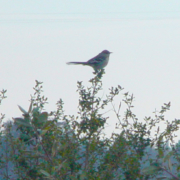Study Assesses Food-Safety Risk Posed by Wild Birds
Scientists at the University of California, Davis, published a study in the Journal of Applied Ecology on their assessment of food-safety risks posed by nearly 10,000 birds that they tracked on lettuce farms on California’s Central Coast. “We wanted to find out the true risk of wild birds to food safety,” said lead author Austin Spence. “Which birds have pathogens, which birds are spending time on farms, and if a bird has a pathogen, does that pathogen survive long in bird poop? Our findings indicate that we can co-manage our areas for both agriculture and conservation.” They found that foodborne pathogens were rare in birds overall, and that pathogens did not persist in small bird feces. Spence summed up the study’s findings on bird fecal matter for produce growers: “If it’s the size of a quarter, don’t harvest near that. If it’s a tiny white speck, it’s very low risk and probably fine.” The researchers estimate that by avoiding current no-harvest buffers when food-safety risks are low, growers of leafy greens could harvest about 10% more of their fields.

 Rex Dufour, NCAT
Rex Dufour, NCAT Michigan State University
Michigan State University USDA
USDA